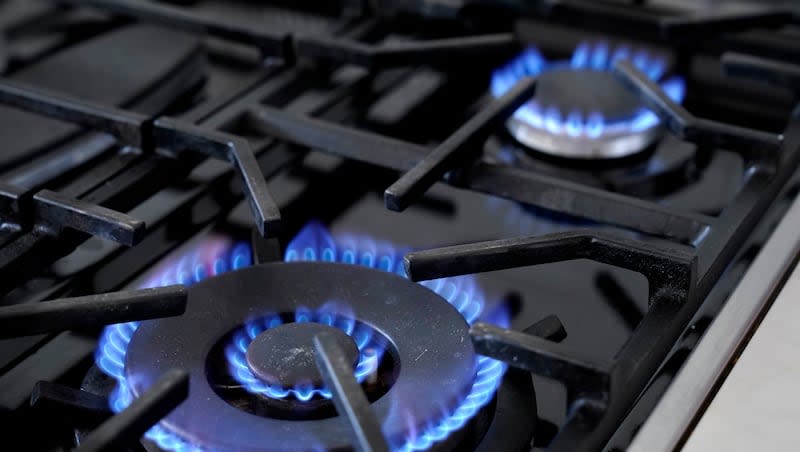The Biden admin wants to change home appliances, Republicans are pushing back

- Oops!Something went wrong.Please try again later.
- Oops!Something went wrong.Please try again later.
The House Republican leadership has organized a lineup of bills it believes will address what the House GOP says is ongoing Biden administration overstep in how household appliances are regulated.
Republican’s war on energy conservation standards
The Committee on Rules will meet Monday with Republican representatives to consider a series of bills that would prohibit the federal government from putting energy conservation standards on household appliances that Republicans say are not cost-effective or technologically feasible.
Hands Off Our Home Appliances Act
Introduced by Arizona Rep. Debbie Lesko, the Hands Off Our Home Appliances Act would prohibit energy conservation standards on any household appliance.
In a post on X, Lesko said the Biden administration’s alleged overreach on regulating household appliances is not a new concept, noting the passage of her previous bill Save Our Gas Stoves.
President Biden worked to ban gas stoves – then pressured SNOPES to change it's fact check about it!
Gas stoves won't be banned on my watch. That’s why we passed my bill, Save Our Gas Stoves, and we’ll do it again with my Hands Off Our Home Appliances Act!…— Congresswoman Debbie Lesko (@RepDLesko) April 11, 2024
The Save Our Gas Stoves Act was passed by the House to stop regulations that would impose new energy efficiency standards for gas stoves, affecting 50% of current gas stove models and leading to higher prices of the product, per Fox News.
After the legislation passed, the Department of Engergy came out with a new, compromise proposal that would instead impact just 3% of gas stove models, according to Fox News.
Liberty in Laundry Act and Clothes Dryer Reliability Act
On Feb. 29, the Department of Energy finalized efficiency standards for clothes washers and dryers to save “American households $2.2 billion per year on their utility bills, while significantly cutting energy waste and harmful carbon pollution.”
Tennessee Rep. Andy Ogles presented the Liberty in Laundry Act to prevent implementation of energy conservation standards on clothes washers.
Furthermore, Mississippi Rep. Mike Ezell introduced the Clothes Dryer Reliability Act to prevent the government from establishing energy conservation regulations for clothes dryers.
Ben Lieberman of the Competitive Enterprise Institute told Fox News the government should stay away from doing these regulations.
“The main concern with these negotiated rulemakings is that it mostly involves the manufacturers and the energy efficiency activists. One wonders how much the interests of consumers are taken into account during this process,” Lieberman said to Fox News.
Refrigerator Freedom Act
Also on Feb. 29, the DOE proposed new rules for residential refrigerators and freezers to reduce utility bills, energy waste and carbon pollution. Projected consumer savings are about $1 trillion over 30 years. Compliance would be required in 2029 or 2030, depending on the configurations of the appliance.
In response, Iowa’s Rep. Marianette Miller-Meeks presented the Refrigerator Freedom Act to prohibit the government from putting new energy conservation standards on refrigerators, refrigerator-freezers and freezers.
Per Newsweek, the new rules for refrigerators and freezers “could lead to higher costs and restrict consumer choice.”
Affordable Air Conditioning Act
In 2023, under the Energy Policy and Conservation Act, first enacted in 1975, the Energy Department set new energy conservation standards for some consumer and commercial products including air conditioners and gas stoves. The department stated these new standards were “technologically feasible and economically justified.”
In response to the new standards, 18 energy and consumer advocacy organizations submitted comments to regulations.gov that the 1975 legislation “does not mandate a new energy conservation standard for cooking products, but permits one only if it benefits consumers. This is not the case here.”
The Affordable Air Conditioning Act, introduced by Texas Rep. Dan Crenshaw, would prohibit the government from mandating new energy conservation standards for room air conditioners.
Stop Unaffordable Dishwasher Standards Act
In energy conservation efforts aligning with the EPCA, the Energy Department also looked at products such as dishwashers, as seen in a proposed rule.
New York Rep. Nick Langworthy presented the Stop Unaffordable Dishwasher Standards Act to prevent the government from establishing energy conservation standards for dishwashers.
Democratic response to bill lineup
MSNBC said the home appliance bills will not progress in the Senate, however Republican representatives “want to be able to tell the ... Republican base that they’re on Capitol Hill, fighting tooth and nail in support of pointless messaging bills ...”
Some Democratic representatives shared their annoyance over the Republican bills:
This is real. This is actually what Republicans are preparing to spend next week on in the House. Really: https://t.co/8VyLSolMZO https://t.co/7yJxwYdFAO
— Rep. Don Beyer (@RepDonBeyer) April 11, 2024
Colorado Rep. Joe Neguse shared a video on X that said, “I don’t think the American people had that in mind. I don’t think they’re thinking of the Liberty in Laundry Act. I think they expect this House Republican majority to address the consequence of challenges that face our country.”
House Democrats are focused on the priorities of the American people.
House Republicans’ top priority?
“The Liberty in Laundry Act.”
Seriously. pic.twitter.com/cFG1oa6T7r— Rep. Joe Neguse (@RepJoeNeguse) April 12, 2024

